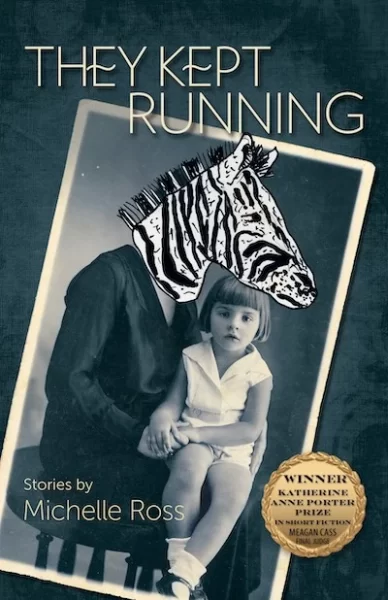
Reviewed by Frannie McMillan
Michelle Ross, 2021 winner of the Katherine Anne Porter Prize in short fiction for They Kept Running (University of North Texas Press, 2022), is the author of two other story collections, There’s So Much They Haven’t Told You (Moon City Press 2017), winner of the 2016 Moon City Press Short Fiction Award and Finalist for the 2017 Foreword INDIES Book of the Year Award for Short Stories, and Shapeshifting, winner of the 2020 Stillhouse Press Short Story Award (November 2021). Given Ross’s award-winning prior collections, it’s no wonder that They Kept Running is such a cohesive, deeply satisfying read.
These 57 stories are divided into three sections populated by female characters at different stages of life. The collection opens with “Accomplice or Hostage,” introducing readers to the complexities of mother-daughter relationships, body image, and mental illness wrapped in the distorted language of a fairy tale. The girl in this story begins to wonder if her mother is hiding a second face, asks questions about what happened to the evil women before the fairy tales begin, and, as the title suggests, isn’t sure whether she is an accomplice or a hostage of the woman she calls mother. Ross keeps the details vague, and readers can’t be sure whether the mother is a villain or a victim.
Most of the characters in Part I are young girls struggling to understand what the adults in their lives are asking of them, like Lindsey in “Killer Tomatoes,” who is navigating both a changing friendship with a bitchy girl named Cheyenne and fending off the advances of her not-uncle, a guy named Rick who assesses Lindsey’s body like “he’s considering an extravagant purchase.” Lindsey’s conclusion, as Cheyenne leaves with Rick to go for a ride, is this: “She can’t know for certain what will happen, but she is learning to anticipate the unthinkable.” As in fairy tales, there are lessons to be learned through close calls with an assortment of villains wearing thin, unconvincing disguises. The men in these stories are predatory and deeply controlling in relation to the girls, who are observing and learning lessons adjacent to what the men think they’re teaching. The mothers’ instruction is often cold and harsh, delivered in a way that lets readers know these women have been punched through by loss and hard lessons of their own. In “Lessons,” a girl named Ellen learns about simple machines with her mother, and “[a]s is the case with most of her mother’s lessons, Ellen understands that this one is at least partly about Ellen’s father.”
By the end of Part I, the girls begin thinking independently, their lessons learned. So it is in “Why Science Lessons that Involve Potatoes Give Me Grief,” “A Girl Scout Is Useful, Thrifty, Cheerful, Courteous, Clean in Thought, and, Above All, Loyal,” “Hail Satan,” and “Dollhouse Furniture.” In “Bargain,” the speaker concludes, after being underpaid for babysitting and driven home by the children’s drunk father: “I could have called and woke my father to tell him to come get me. But I didn’t. Just like how a few years later, I wouldn’t speak up in so many other circumstances involving men who would make me feel as small and as inconsequential as a gnat.”
Part II opens with “Phainopepla,” a story with a Hansel and Gretel quality about a brother and three sisters who live apart from one another in the woods. The female characters here are older, their instincts sharper from lessons learned in childhood. Still the men persist in gaslighting the women, like in an exchange between the brother and oldest sister where he claims their mother died of a broken heart. The sister counters with “I heard she died of cancer,” and the brother tells her “[y]our ingratitude tore a hole in her heart that let the cancer in.” The men in this section of the book continue being deliberately obtuse and controlling, plundering women as they please like in “Fertilizer,” “Three Ways to Eat Quince,” and “The Funny Thing.” And yet, something shifts in the way the women interact with the world. Readers see female characters shedding their childhood ignorance as they step into their own power and intelligence.
Motherhood slides into the conversation with “Impulses,” and “Palate Cleanser.” In “Tobe’s Baby,” a woman named Loni tries to help her boyfriend, Tobe, resuscitate his eight-month-old baby after Tobe sends the child down a water slide. Throughout the story Loni evaluates her relationship with Tobe, refers to pregnancy as “cirrhosis of the uterus,” and delivers this final verdict: “She hoped Tobe was right, that the baby would be okay. Wasn’t her problem, though.” Ross has readers cheering Loni on, and this last line feels like a victory for a woman who has finally had enough and walks away without carrying the guilt of a so-called failed relationship on her back.
In “The Scream Queen Is Bored,” readers see Carly, an actor in a low budget slasher film offering directorial suggestions of her own, fantasizing about how she would kill the other actors if she were the psycho killer. In the final lines of the story, she shuts Frank up with a witty comeback he wasn’t expecting, “[s]laughtered him so quick, he didn’t have a chance to scream.” Or in “Binary Code,” where three women jogging in a desert have a conversation about misogyny. Despite the heat, the unforgiving terrain, and the catcalling they endure from a passing jeep, the women keep pushing, keep talking. Nahala concludes “[t]here’s no pattern of dress that can make a woman’s autonomy and worth of equal value to a man’s.” The collection’s title comes from the final line of this story, where the women are moving so slowly up the hill that they’d make the same time walking, “[b]ut still, they kept running.” Ross more than nods to female persistence in the face of misogyny by embedding the title inside this particular story.
The final section of this collection presents women who’ve run the gauntlet of childhood, adolescence, and early adulthood to arrive at the point in life where they’re supposed to know what they’re doing. But we all know that life isn’t quite that scripted, and the narrator in “One or Two” revisits that feeling of paralysis in the midst of a situation that feels all wrong that the babysitter from “Bargain” felt in Part I. In this cringe-inducing story, the female narrator is at the optometrist’s office, and the entire interaction with the male doctor is all wrong. He is too close, he offers her a contact on his finger and she speculates about the unseen bacteria, how unclean this is. She imagines her husband asking “Why didn’t you just tell him you’d rather not put a contact lens in your eye that has been on someone else’s finger?” She remembers a time when she was 17, sitting in a movie theater when an older man touched her thigh repeatedly. There is a laugh-so-you-don’t-cry shade of humor in Ross’s work that makes her razor-sharp observations about how men abuse women easier to take. So when this optometrist touches the narrator’s eyeball (I know–I gasped too) I laughed out loud when she wondered “How do I know he’s not some pervert who gets off on touching people’s eyeballs?”
This is something Ross does well throughout the collection–injects a moment of levity into a situation that so accurately depicts what it means to be a woman and lose your voice or be paralyzed by fear. In “Snapshot,” a woman who is driving sees a man on the side of the road with his head in his hands. Later, she tells her husband about it, saying “she’d pictured herself pulling over, knocking on the man’s window, saying something to comfort him […], but what if he’s a misogynist? What if he’s violent?” She tells her husband “[t]hat’s what it is to be a woman in this world. You can’t even empathize with a stranger without thinking about your own safety.” To which her husband replies, “Probably he wasn’t a misogynist.” He completely (and hilariously) misses her point entirely. The men in this final part of the collection are less frightening, maybe because the women are older now and they’re no longer as afraid since they’ve survived this long in a world that caters to the whims of men. Some of these stories, like “Dead Plant,” and “My Husband Is Always Losing Things,” introduce narrators who examine themselves and their partners in a way that is clinical, yet gentle. In “My Husband Is Always Losing Things,” the narrator watches Marie Kondo as her husband searches for his glasses. She thinks about the way Kondo encourages her audience to release whatever no longer serves them, but argues that “[j]oy isn’t the only measure of value.” By the end, she wishes she could see inside her husband, “peel back the skin and muscle, cut through the bone. Reveal the hidden spaces. Only the clutter might be worse than I imagine. I fear what I might find there, or not find. Would I be able to locate myself at all?”
Science and nature, language and meaning, film and fairy tale, challenging female friendships, disappointing and often predatory men, confusing mothers and mother figures, education and family–these are the constants within these stories. The end result is a collection that makes readers consider if what we want, or how we expect to be treated, is asking too much. Like Don in “Cake or Pie,” who, when considering the type of woman who would be a good doomsday prepper companion, wants “[s]omeone whose desires are discreet. Someone easily satisfied. Or maybe: someone for whom satisfaction is not necessary, for whom survival is enough.” Don wants someone for whom “sweetness is nonessential.” This central question is one Ross explores with a keen eye–Is life only about survival, or are we allowed to demand softness and sweetness to live?
They Kept Running is available for pre-order from UNT Press.
____________________________
 Frannie McMillan’s poetry has appeared in The Coachella Review, K’in Literary Journal, The Indianapolis Review, and others. She is currently at work on her first chapbook, You Ain’t By Yourself. By day, she connects young people with books as a secondary librarian in Richmond, Virginia. You can find her on Twitter @franniemaq.
Frannie McMillan’s poetry has appeared in The Coachella Review, K’in Literary Journal, The Indianapolis Review, and others. She is currently at work on her first chapbook, You Ain’t By Yourself. By day, she connects young people with books as a secondary librarian in Richmond, Virginia. You can find her on Twitter @franniemaq.
